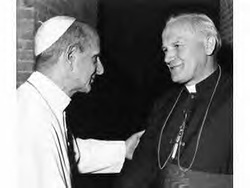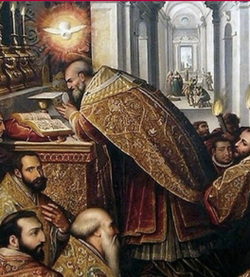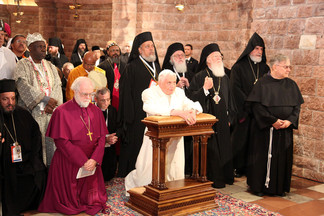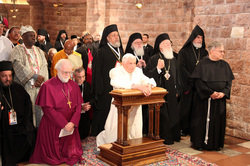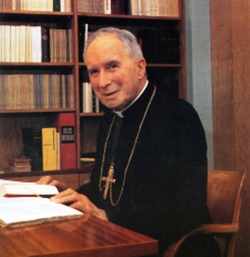
Not much, it's a mystery, an improbable mystery.
It's a great tragedy for the Church, because ultimately, who's with the Pope is with the Church, is with the unity of the Church... But there is also a question mark. When we say "How is it possible that the Pope, if he's truly Pope, successor of St. Peter, he must in consequence have the inspiration of the Holy Ghost, he must be protected by the Holy Spirit in what he does, because he's the Pope we have the promise of our Lord that he will be protected in upholding the faith... Therefore someone who does these kinds of things is not Pope...This Pope is doing things that are so contrary to the faith, against the Church, so destructive to the faith of the Church, and the Church itself... But it's not the Pope, it's his entourage... Well, here's one solution. The Pope is a prisoner, the Pope is a martyr, the Pope is locked in, the Pope isn't free to do what he wants, the Pope is drugged, the Pope is half-crazy, the Pope is I don't know what, he's a human wreck who is led around and manipulated...That's one solution. It's a solution that I'd say is astonishingly supported by many visionaries, people who think they have visions, I'd say they are diabolical in origin, these visions.
These visions of those who say that the Holy Father is a prisoner, that the Holy Father is somehow incapable, that he's drugged, for the thirteen years that he's been there he has no responsibility for anything. They've locked this man up and then eventually we get to the point where there's another Pope who is imprisoned under the Vatican, then they've given him a double and other things like this that are just ridiculous, ridiculous, ridiculous, no? Idiotic, completely idiotic, aren't they, and all of this is very smart on the part of the devil because this sways a certain amount of people, right, who are always saying: The Pope! The Pope! The Pope! No, no, no, don't speak to me about the Pope! Be obedient! Be obedient! I beg you, I beg you, it's his entourage, it's not him.
But I will say you can also look at the problem from another angle and say: good, ultimately I agree with you, it's not possible that the Pope who is protected by the Holy Ghost, by the words of Our Lord Jesus Christ, could do things like this. There we agree, it's not possible, it doesn't fit, this destruction of the Church, this destruction of the Social Reign of Christ the King, this destruction of the Catholic faith in every aspect, every catechism, every university, every religious order, the seminaries, everywhere you look it is the systematic destruction of the Church, which was aimed at by all of these reforms that the Vatican implemented, because Vatican II wasn't, I'd say, what allowed these reforms to be put into effect, what had to be done was to implement the reforms of Vatican II in an equivocal way, this allowed them to start putting the reforms into practice and this was the goal, it [ Vatican II I believe ] was the springboard that permitted all this, so it can be said that the Holy Father, in effect, that it's not possible that a Pope could do all this, therefore he's not Pope.
This reasoning is worth, this reasoning, I don't know, I don't say that's what's going on and there are several scenarios, maybe this one has some merit, we'll know the truth later maybe, I don't know, I don't know. The way I see it, it's not clear yet, you understand, but one day if it came to light that it was true, and this is something that is far from impossible, here also, there are apparitions that say the same thing and these apparitions have been recognized by the See of Peter, Fatima, La Salette, that say that the devil will climb to the highest places in the Church, I don't know if by the "highest place in the Church" that means Secretary of State, and then stops there, or if it goes even farther, if it goes all the way to the Pope. I don't know maybe even to someone who says he's the Pope, I don't know, but you know this is something that isn't impossible and theologians have studied this problem, the theologians have studied this problem to see if it's something that can happen, if a Pope can perhaps be a heretic and as a result excommunicated from the Church and therefore all his acts become illegitimate and invalid. And if, just as a hypothesis, once again I just don't know, don't put words in my mouth, I don't know, but if at last it comes out that quietly that there are certain connections to Masonry, imagine that the Pope was registered in a Masonic lodge before his election, he would be excommunicated. Excommunicated... His election is invalid, he can't be Pope and we would have had for all this time... A Pope who wasn't Pope. This is possible. Once again I don't say this is what is really happening but what do you want in a situation like this, we're looking for a solution. We find ourselves with a problem that has almost no theological solution, theologically, I say theologically almost impossible to solve, so we search for a solution, fine! A solution that he is a prisoner, drugged, this is possible. I admit that when you see him move around and talk, personally I haven't seen him for two years, I haven't seen him in the flesh, I mean privately but with a public audience, I saw him put aside his paper and his script, speaking with a skill, a fluidity, getting to the point, with intelligence but in full possession of his faculties, in full possession of his faculties, not a man who had been drugged, or who has been given a shot or who... Not at all! The farthest thing from it!
Well then, when he blessed the Pentecostals, was there a revolver pointed at his head? When he kissed the feet of the Orthodox was there a revolver pointed at his head? ... No, this is absurd, it's not possible. Besides Mgr. Benelli said to me three weeks ago, when I saw him, Mgr. Benelli said to me: 'It's the Pope who wrote you those letters, you don't want to believe it but it's the Pope who wrote them to you, he is fully up to date, he is up to date about everything, he knows very well what he's doing and he's the one who wants all this happen and he makes the decisions and when I leave, when this conversation we're having is over and I leave, I am going to see the Pope every day, and I am immediately going to tell him what was said in this conversation.
From the French
